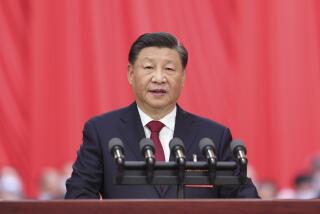China Plans to Reform--Cautiously : Inflation, Corruption Are Major Problems, Li Tells Congress
- Share via
BEIJING — Acting Premier Li Peng, in a report Friday to the opening session of the 7th National People’s Congress, outlined plans for deep, market-oriented reforms in China but warned of a need for caution in implementing them.
“The situation in the past five years shows that . . . we sometimes have to make a detour,” Li declared in a 2 1/2-hour speech to 2,970 delegates gathered in the Great Hall of the People in central Beijing. He continued:
“On the one hand, we should adhere to our original goals, maintain our direction in construction and reform, keep up our morale and be more confident. On the other hand, we should be prepared for possible difficulties on the road ahead (and) take into account what the state, the enterprises and the masses can tolerate.”
Serious Problems Cited
Li specifically recognized serious problems with agriculture, inflation and corruption, which he said must be dealt with properly to ensure stable progress in reforms. He also made a political commitment to winning broad public acceptance for some necessary but unpopular reform measures.
Li is viewed by some observers as less committed to rapid reform than is Zhao Ziyang, general secretary of the Chinese Communist Party. However, the thrust of his report, which to a large degree represents the collective views of China’s top leaders, was to endorse reforms promoted by Zhao and China’s paramount leader, Deng Xiaoping, and to assess the problems that must be solved to ensure their implementation.
“Although reform will ultimately bring immense benefits to the people, certain specific measures of reform may not bring them immediate benefits and may even work temporarily against the interests of some people,” Li said. “We must face up to this problem. . . . We should help the masses to gain a clear idea of the content, significance and necessity of the measures we take.”
Concern About Inflation
Li described inflation--officially 7.3% last year--as “the outstanding problem in our economic and social life today.”
Price reform, although it contributes to inflation, is necessary and must be pushed forward, he said, because some agricultural and basic industrial products have been irrationally underpriced for many years.
Other factors have also contributed to inflation, he said, including government printing of too much money, too much spending on construction projects and the outstripping of supply by public demand. He said the government will make corrections in these areas.
“We shall control the extent of price rises and keep the overall price level relatively stable, preventing the rises from going beyond the endurance of various sectors,” he said.
He said China’s central bank “should limit the amount of currency issued so as to avoid inflation,” and he pledged that “in the future the government will finance any deficit spending chiefly by issuing bonds.”
Higher Prices for Produce
Although Li offered few details, he indicated that increased agricultural production will be encouraged by higher prices paid to farmers for their produce, and that city dwellers will receive subsidies to protect them from the full impact of inflation in basic foodstuffs.
Li set the target for grain production at 500 million tons by the year 2000, up from from 402 million tons harvested in 1987. At the same time, China hopes to increase production of important cash crops. This will require increased investment in agriculture, he said.
Still, Li said, because grain production is relatively low on a per-capita basis, “for a relatively long time . . . a major increase in supplies of meat, poultry, eggs and other animal food products will not be possible.”
Li acknowledged that in the course of reform, “such reprehensible practices as tax evasion, bribery, extortion, forgery and illegal imitation of brand-name products have appeared here and there.” Some cadres, he said, “have abused power for personal gain, and some have been guilty of embezzlement and corruption.” He said that such problems “must be earnestly addressed.”
Change in Role of Congress
Li began his speech with a review of economic accomplishments in the last five years, since the 6th National People’s Congress. The congress, China’s nominal legislature, endorses decisions made by top party and government leaders, but in recent years it has begun to have a measure of genuine influence over the drafting of laws.
Between 1982 and 1987, after accounting for price rises, peasants enjoyed an average growth in real net income of 8.6% a year, Li said, and urban residents had an average growth of 6.3% a year in real income available for living expenses. China’s economy expanded at an annual rate of 11.1 %, he said.
Li also referred to the anti-Chinese rioting that occurred March 5 in the Tibetan capital of Lhasa.
According to Western witnesses, at least eight people died in the rioting. Buddhist monks in Lhasa have told foreign tourists that the death toll was higher, that 16 monks were killed inside the Jokhang Temple when the police took control of the building. The rioting began with a demonstration by Buddhist monks in favor of Tibetan independence from Chinese rule.
‘Handful of Separatists’
“The recent riot in Lhasa created by a handful of separatists was a grave incident that violated the law and undermined the unity of the motherland,” Li said. “The rioters must be severely punished.”
The National People’s Congress, which is scheduled to meet for about 20 days, is expected to confirm Li, 59, as premier. It is also expected to elect veteran military leader Yang Shangkun, 81, to replace Li Xiannian, 79, in the largely ceremonial post of president.
More to Read
Sign up for Essential California
The most important California stories and recommendations in your inbox every morning.
You may occasionally receive promotional content from the Los Angeles Times.













